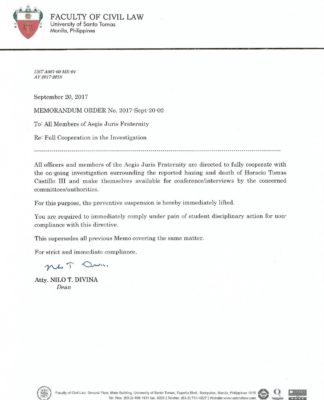THE SUPREME Court has ruled on the constitutionality of the controversial Cybercrime Law, upholding certain provisions, striking down some. Significant to note is that the Court has sustained the provision punishing “online libel.”
To recall, the Cybercrime Law drew flak when it was enacted in 2012 for its alleged infringement on the consitutional right to free expression. Thus, the Court immediately stopped the government from implementing the law.
One salient feature of the law is the clause punishing acts of libel committed through the use of the Internet as defined in Article 355 of the Revised Penal Code. But what made it contested was the fact it also punished those who merely receive the malicious article and react to it. Thus, a person who commented on a malicious Facebook post may be prosecuted uner the Cybercrime Law.
Constitutionalists, including Fr. Joquin Bernas, SJ, who was a member of the commission that drafted the 1987 Constitution, noted how the law had a “chilling effect”, which could deter Internet users from expressing views online for fear of subsequent punishment.
After more than one year, the Supreme Court has finally decided on the issue. It upheld the provisions which punish online libel, data interference, cybersquatting, computer-related identity theft, cybersex, child pornography and allowing search and seizure of computer or internet data.
At the same time, the provision punishing unsolicited commercial communications, and one which authorizes the collection or recording of traffic data in real-time and one which allows the Department of Justice to block access to suspected computer data were struck down as unconstitutional.
Thus, the debate narrows down to the propriety of sustaining the illegality of online libel.
Some are quick to decry the Court ruling for upholding the provision punishing online libel, quick to invoke the Constitutional guarantee to free expression.
It may be necessary to hark back to the legal history of libel and its relation to freedom of expression.
Ever since the US Supreme Court ruling in the case of Chaplinsky vs. New Hampshire in 1942, it was understood that libel was not protected by the First Amendment of the Constitution, whose counterpart in the Philippines is Freedom of Expression. And in a subsequent case, New York Times Co. vs. Sullivan, in 1964 it was held that the burden of proving malice in a libel suit is with the one who filed the suit.
The Philippines adopted such principles. It may be important to note that very few libel suits, particularly against journalists who are the usual respondents in a libel suit, ever succeed, because of the difficulty in proving malice. Also, under the Revised Penal Code defining libel, fair commentaries on public matters, are considered non-libelous.
It thus makes a person wonder why the National Union of Journalists of the Philippines (NUJP) and even the College Editors Guild of the Philippines (CEGP), which the Varsitarian co-founded in 1931, are in the forefront of the crusade against online libel when it merely updates an age-old law. Surely, those who drafted the country’s penal code more than 80 years ago could not have predicted the existence of social media.
If a malicious writing published on a newspaper with a relatively low readership is a ground for libel, is it not reasonable that a malicious writing published online where it has potential to easily spread like wildfire, should also be a ground for libel?
Legitimate journalists have no reason to fear any libel law, because real journalists do not impute libel in their writing, whether it be a news report or a commentary.
Most are under the impression that criticizing erring public officials is libelous per se, when in fact it’s not. The Cybercrime Law does not stop anyone from criticizing Pnoy or any other government official as long as done within the ambit of decency. The only problem now thus boils down to whether or not Filipinos can be decent.
Law and jurisprudence practically give media men a huge leeways to commit errors and be critical, without violating the law.
Lest the Varsitarian, the 86-year-old student publication of UST, through this editorial be accused of being aloof to the concerns journalists, it may be important to mention that the ‘V’ has been a victim of baseless libel suits to harass its writers and editors on more than one occassion. But of course, it did not go anywhere,with the complainants having failed to prove even an iota of malice in the imputed articles. Surely, the Varsitarian, through this editorial, knows where it stands and whereof it speaks.
To clarify, the Varsitarian does not advance any curtailment of free speech nor does it necessarily support the enactment of the Cybercrime Law. It merely adheres to the age-old principle that all freedoms are not absolute, lest there be anarchy.
A Satanist cannot invoke his freedom of religion to justify murder on the ground that his religion supports human sacrifices; and it is for the same reason that a person cannot invoke freedom of expression in maliciously destroying a person’s reputation.


















